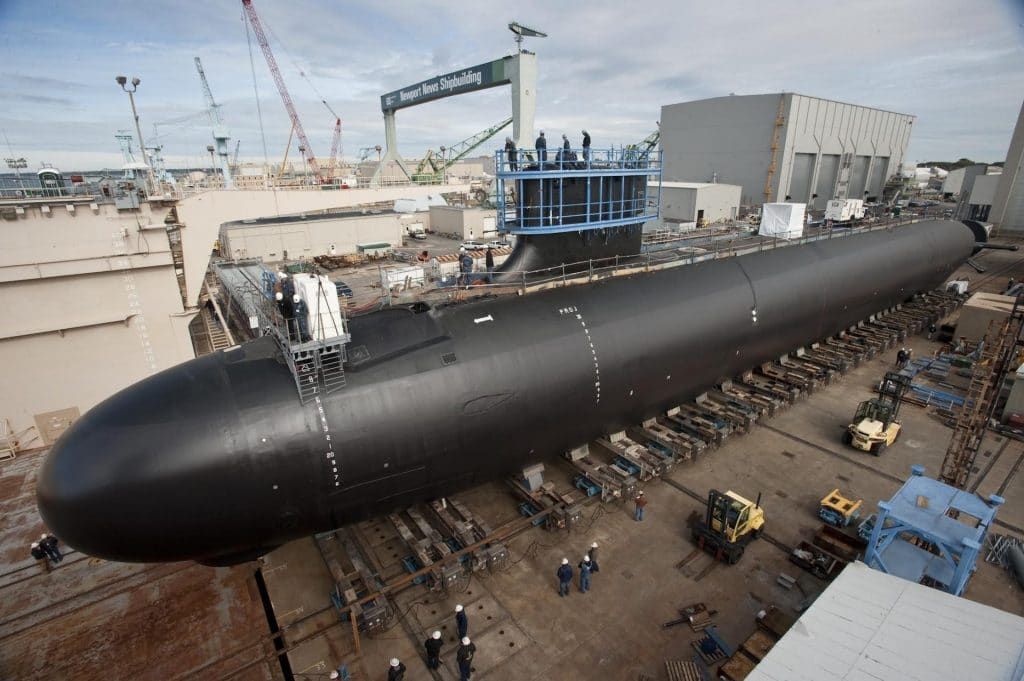Trump’s 2021 budget: More nuclear spending, less of almost everything else
By Lawrence J. Korb | February 12, 2020
 The USS Minnesota, a Virginia-class attack submarine, under construction in 2012. The Pentagon is requesting to cancel one Virginia-class submarine to help fund an increase to the National Nuclear Security Administration’s 2021 budget. Photo credit: US Navy.
The USS Minnesota, a Virginia-class attack submarine, under construction in 2012. The Pentagon is requesting to cancel one Virginia-class submarine to help fund an increase to the National Nuclear Security Administration’s 2021 budget. Photo credit: US Navy.
The Trump administration’s budget request for 2021 has its priorities backward. Rather than expand the nuclear weapons budget at the expense of everything else, the United States could meet its goals with a much leaner nuclear force, leaving more money for the programs that will actually make the country safer.
Given that the US defense secretary has been arguing for the Pentagon to focus more resources on challenges from strategic competitors such as China and Russia, one would have expected that ships and combat aircraft programs would have received increased funding in the Trump administration’s latest request. But, in that request, not only did these programs not grow, they were actually cut back both from their projected increases and below fiscal 2020 levels.
But what did grow in real terms was funding for nuclear weapons programs. In fiscal 2020, the Defense Department will spend about $25 billion on modernizing the weapons in its nuclear arsenal. For 2021, it seeks to grow that account by $4 billion, to a total of about $29 billion, a 16 percent increase. The National Nuclear Security Administration (NNSA), the part of the Energy Department that develops nuclear technology, wants to spend another $20 billion, a $3 billion (or 19 percent) increase over 2020. Together this means that the Trump administration proposes to spend about $50 billion on its nuclear weapon programs. If one adds what it will spend on cleaning up nuclear sites and on missile defense, that number climbs to about $75 billion.
Supporters of spending more on nuclear programs will argue that nuclear weapons are not that expensive, since they do not consume a very large portion of the defense budget. For example, the $50 billion cost of the Defense Department delivery systems and NNSA warhead development amounts to only about 7 percent of the entire $740 billion defense budget. Even if one adds the $5 billion for environmental cleanup and the $20 billion for missile defense, the proportion rises only to about 10 percent of the total defense budget.
But this is misleading. A better comparison would be limited to what the Defense Department spends on the procurement and research and development portions of its budget, leaving out the funds allocated for things like personnel, operation and maintenance, and warfighting. For 2021, the department proposes to spend about $244 billion (about $4 billion less than last year) on these items. That means that even without missile defense and environmental cleanup, the nuclear programs will amount to 20 percent of the budget. If one adds in these two items, the percentage going to nuclear weapons rises to 30 percent. Such a proportion is unsustainable. In fact, the Navy has already had to cancel one Virginia-class nuclear attack submarine to fund the increase in the NNSA budget.
Plus, $50 billion for nuclear weapons is more than the entire State Department, Justice Department, or Housing and Urban Development budgets.
To spend its money more wisely, the Trump administration needs to extend the New START treaty with the Russians and get back to the bargaining table, so it can begin cutting its nuclear arsenal to no more than 1,000 deployed nuclear weapons and cancel both the long range standoff weapon and the land-based portion of its nuclear modernization program. That will allow the United States to devote more of its limited resources to programs that actually make the country and the world safer.
Together, we make the world safer.
The Bulletin elevates expert voices above the noise. But as an independent nonprofit organization, our operations depend on the support of readers like you. Help us continue to deliver quality journalism that holds leaders accountable. Your support of our work at any level is important. In return, we promise our coverage will be understandable, influential, vigilant, solution-oriented, and fair-minded. Together we can make a difference.
Keywords: NNSA, nuclear budget, nuclear modernization
Topics: Nuclear Weapons, Opinion















